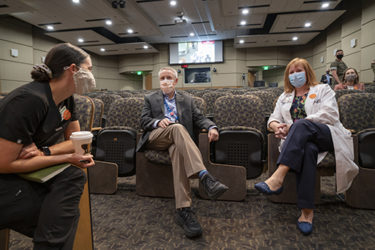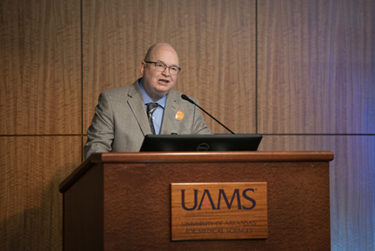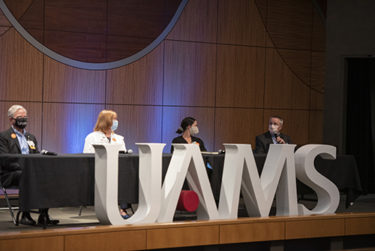Chancellor’s Town Hall Focus on COVID-19 Booster Vaccinations
| Discussion and questions about third COVID-19 vaccine booster shots dominated the Chancellor’s Town Hall on Sept. 23 at UAMS even as decisions about them were being made at the national level.

Lt. Col. Suzanne Cobleigh, left, talks to Robert Hopkins, M.D., and Michelle Krause, M.D., MPH., before the start of the Town Hall at UAMS.Image by Evan Lewis
Near midnight Sept. 23, the Centers for Disease Control and Prevention approved booster shots for people employed in frontline patient care, people over 65 and others who might be vulnerable to COVID-19. (More information about booster shots at UAMS)
Only people who have had the first two doses of the Pfizer vaccine are eligible for a booster under the new criteria.
“It’s important to know that we don’t mix vaccines,” said Michelle Krause, M.D., MPH, professor in the Division of Nephrology in the UAMS College of Medicine Department of Internal Medicine. “If you had the primary series of Moderna vaccine and come for your third dose with Pfizer, we won’t be giving that third shot. Your first series has to be Pfizer for that third dose.”
After urging everyone to get vaccinated against seasonal influenza, Robert Hopkins, M.D., said during a question-and-answer segment of the meeting that it’s safe to receive COVID-19 vaccination, including booster shots, at the same time as the annual shot.
(Watch video of the Town Hall meeting.)
Hopkins is a UAMS professor and division director of General Internal Medicine and chair of the National Vaccine Advisory Committee to the U.S. Department of Health & Human Services.

John Arthur, M.D., Ph.D., presents the findings of his research team.Image by Evan Lewis
Chancellor Cam Patterson, M.D., MBA, answered the first question asked at the Town Hall: Will UAMS require all employees to be vaccinated against COVID-19 in compliance with a proposed federal mandate?
“Our pathway for requirement requires approval from the Arkansas Legislative Council,” Patterson said. “We are in the process of having conversations with members of the state legislative bodies to determine that pathway forward because at the end of the day, they are going to determine, based on state law, whether we can indeed move forward with that. Obviously, we are in a little bit of a tricky place between state law and federal guidelines for complying with requirements for vaccination.”
The chancellor said it does appear health care providers who fail to comply with federal guidance to require vaccines, with some limited exceptions, could be at risk of losing all Medicare and Medicaid. That would be very bad for UAMS and for the people of Arkansas.
Furthermore, a failure to comply could result in the loss of federal funding for scientific research being done at UAMS like the research findings presented at the Town Hall by John Arthur, M.D., Ph.D., Patterson said.
Arthur briefed the audience on the recent findings of his collaborators and members of his research team regarding long COVID syndrome.
As many as 30% of COVID-19 patients experience lingering fatigue, brain fog and shortness of breath. The cause of long COVID-19 has eluded scientists, but the UAMS team’s discovery sheds important new light on the molecular-level mechanisms behind it.
The research team was brought together quickly this spring by the UAMS Translational Research Institute to test the hypothesis that developed through discussions between Arthur and UAMS’ Terry Harville, M.D., Ph.D., a professor in the Department of Pathology and medical director of the Histocompatibility and Immunogenetics Laboratories.

The Town Hall panel included, left, Steppe Mette, Michelle Krause, Suzanne Cobleigh and Robert Hopkins.
Researchers Karl Boehme, Ph.D., Craig Forrest, Ph.D., and Shana Owens, Ph.D., in the Department of Microbiology and Immunology developed the assay (test) used to identify the two antibodies that are factors in inflammation that causes the symptoms of long COVID.
Arthur said different lines of research from members of the team had to come together to result in its discoveries. Researchers who had never worked together before had to collaborate closely.
“Our next step is enrolling patients, assessing their symptoms and then measuring their antibody levels for this,” Arthur said. “If we are successful, we hope it will lead to a treatment for the long COVID syndrome. I have been contacted by people from all over the country with heartbreaking stories about all the terrible symptoms they have with long COVID.”
Steppe Mette, M.D., UAMS Medical Center CEO and senior vice chancellor of UAMS Health, and Mark Williams, Ph.D., dean of the UAMS College of Public Health, also delivered positive news, albeit with some stipulations.
Mette said UAMS Medical Center has the fewest number of COVID-19 patients — 34 on Sept. 23 — in three months. Enough medical supplies are on hand, and hospital capacity is “reasonable.”
The statewide daily rate of new cases is falling and the rate of deaths from COVID-19 is flat, Williams said. Arkansas may be on the down side of an exponential growth curve.
“We have to be cautious in our outlook,” the dean said. “It is too early to be certain.”
Patterson, Mette and other speakers at the meeting thanked Lt. Col. Suzanne Cobleigh for the presence of the 21-member military medical team she leads that is providing relief to UAMS Medical Center’s hard-pressed physicians, nurses and respiratory therapists. She said in a little more than a week, the team already had contributed 1,572 clinical hours to patient care.
